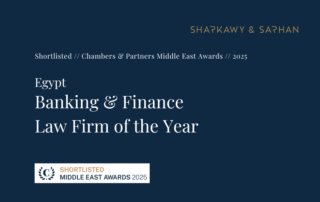3rd of January, 2017
New EFSA Decisions
Keywords: Financial Institutions, Banking & Finance
New Rules On Pre-emption Rights In Capital Increases & On Acquisition of Brokerage Companies
Back in October, Decree 95/2016 of the Minister of Investment introduced some amendments to the Executive Regulation of the Capital Market Law regarding pre-emptive rights of existing shareholders in a capital increase. The Decree also introduced new rules on acquisition and control of brokerages companies and investment management companies. Last week, the Egyptian Financial Supervisory Authority (“EFSA”) published in the Official Gazette detailed rules on both topics.
EFSA New Decisions Regarding Pre-Emptive Rights Of Existing Shareholders In A Capital Increase:
The Companies’ Law 159/1981 and the Capital Market Law 95/1992 stipulated that, in every capital increase, existing shareholders in joint-stock companies have a pre-emptive right to subscribe in the increase before any new investor is given the chance to subscribe. This is unless the EGM calling for the increase decides not to permit the exercise of pre-emption rights, based on valid reasons. Both laws stated that such pre-emption right may be traded either separately or along with the existing shares. However, until recently, both laws did not provide much detail as to how such right may be traded. In 2012, EFSA amended the-then-applicable listing rules to provide rules on trading of pre-emption rights in listed companies only.
In the above mentioned October Decree, the Minister of Investment modified Article 30 of the Executive Regulation of the Capital Market Law to the effect of limiting the rules stipulated in the Capital Market Law to the trade of pre-emption rights in listed companies and companies publicly offering their shares. Closed companies are still subject to the pre-emption rules stated in the Companies’ Law. Accordingly, there are now slight differences between how pre-emption rights are exercised in listed and publicly traded companies on the one hand and in closed companies on the other hand.
For listed and publicly traded companies, EFSA introduced two amendments regarding pre-emption rights in Decree 137/2016 and Decree 138/2016 (attached in Arabic):
- Trading pre-emptive rights during capital increase is now mandatory. Prior to the amendment, it was optional to trade these rights. Meaning that in the capital increase, the company and the shareholders need not deal with the trade of the pre-emption rights, other than invite the shareholders to declare the exercise of such rights. The new rules provide details on bookkeeping and registration of pre-emption rights in publicly traded companies (listed companies had previously been regulated in this regard). In all events, the EGM can still decide to not implement pre-emption rights.
- The trading of the pre-emptive rights must be separated from the trading of the shares themselves during the capital increase pursuant to the new amendments. Previously, pre-emption rights could be traded either separately or along with the shares.
EFSA New Decisions Regarding The Acquisition And Control Of Brokerages Companies, Investment Managers:
EFSA announced that in its attempt to prevent the centralization of the Egyptian market size in the hands of a limited number of shareholders (See here.), it introduces new rules on the acquisition and control of brokerages companies and investment managers. Various sources report that these rules were issued in response to EFSA’s row with Naguib Sawiris over Sawiris/Beltone’s attempt to acquire CI Capital through Orascom Telecom Media and Technology Holding’s “OTMT”, which were rejected by EFSA. (See here, here, and here.)
In the above-mentioned October Decree, the Minister of Investment added two new articles to the Executive Regulation of the Capital Market Law regarding the topic. Last week, EFSA also issued Decree 135/2016 and Decree 136/2016 setting out the rules that shall be followed regarding the acquisition of brokerages companies and investment managers as well as EFSA’s fees in this regard. The decrees provide the following:
- The amendments prohibit any natural or legal person to acquire directly or indirectly more than one third of the capital brokerage companies and investment funds’ management, which own more than 10% of the Egyptian market, or any percentage that leads to actual controlling over the before-mentioned companies, until after obtaining the approval of EFSA’s board of directors, and according to the rules that set by EFSA’s new decision. Moreover, if any action occurred without following the above-mentioned rules it shall be null and void.
- If any person owns by inheritance or testaments more than the above-mentioned percentages or what may lead to the actual control of the company, such person must adjust his situation in accordance with the rules set by EFSA’s board of directors within a period of two years starting from the date of obtaining the increase; otherwise, if he did not adjust his situation he will not have the right to vote in the General Assembly or the board of Directors.
Back in October, Decree 95/2016 of the Minister of Investment introduced some amendments to the Executive Regulation of the Capital Market Law regarding pre-emptive rights of existing shareholders in a capital increase. The Decree also introduced new rules on acquisition and control of brokerages companies and investment management companies. Last week, the Egyptian Financial Supervisory Authority (“EFSA”) published in the Official Gazette detailed rules on both topics.
EFSA New Decisions Regarding Pre-Emptive Rights Of Existing Shareholders In A Capital Increase:
The Companies’ Law 159/1981 and the Capital Market Law 95/1992 stipulated that, in every capital increase, existing shareholders in joint-stock companies have a pre-emptive right to subscribe in the increase before any new investor is given the chance to subscribe. This is unless the EGM calling for the increase decides not to permit the exercise of pre-emption rights, based on valid reasons. Both laws stated that such pre-emption right may be traded either separately or along with the existing shares. However, until recently, both laws did not provide much detail as to how such right may be traded. In 2012, EFSA amended the-then-applicable listing rules to provide rules on trading of pre-emption rights in listed companies only.
In the above mentioned October Decree, the Minister of Investment modified Article 30 of the Executive Regulation of the Capital Market Law to the effect of limiting the rules stipulated in the Capital Market Law to the trade of pre-emption rights in listed companies and companies publicly offering their shares. Closed companies are still subject to the pre-emption rules stated in the Companies’ Law. Accordingly, there are now slight differences between how pre-emption rights are exercised in listed and publicly traded companies on the one hand and in closed companies on the other hand.
For listed and publicly traded companies, EFSA introduced two amendments regarding pre-emption rights in Decree 137/2016 and Decree 138/2016 (attached in Arabic):
- Trading pre-emptive rights during capital increase is now mandatory. Prior to the amendment, it was optional to trade these rights. Meaning that in the capital increase, the company and the shareholders need not deal with the trade of the pre-emption rights, other than invite the shareholders to declare the exercise of such rights. The new rules provide details on bookkeeping and registration of pre-emption rights in publicly traded companies (listed companies had previously been regulated in this regard). In all events, the EGM can still decide to not implement pre-emption rights.
- The trading of the pre-emptive rights must be separated from the trading of the shares themselves during the capital increase pursuant to the new amendments. Previously, pre-emption rights could be traded either separately or along with the shares.
EFSA New Decisions Regarding The Acquisition And Control Of Brokerages Companies, Investment Managers:
EFSA announced that in its attempt to prevent the centralization of the Egyptian market size in the hands of a limited number of shareholders (See here.), it introduces new rules on the acquisition and control of brokerages companies and investment managers. Various sources report that these rules were issued in response to EFSA’s row with Naguib Sawiris over Sawiris/Beltone’s attempt to acquire CI Capital through Orascom Telecom Media and Technology Holding’s “OTMT”, which were rejected by EFSA. (See here, here, and here.)
In the above-mentioned October Decree, the Minister of Investment added two new articles to the Executive Regulation of the Capital Market Law regarding the topic. Last week, EFSA also issued Decree 135/2016 and Decree 136/2016 setting out the rules that shall be followed regarding the acquisition of brokerages companies and investment managers as well as EFSA’s fees in this regard. The decrees provide the following:
- The amendments prohibit any natural or legal person to acquire directly or indirectly more than one third of the capital brokerage companies and investment funds’ management, which own more than 10% of the Egyptian market, or any percentage that leads to actual controlling over the before-mentioned companies, until after obtaining the approval of EFSA’s board of directors, and according to the rules that set by EFSA’s new decision. Moreover, if any action occurred without following the above-mentioned rules it shall be null and void.
- If any person owns by inheritance or testaments more than the above-mentioned percentages or what may lead to the actual control of the company, such person must adjust his situation in accordance with the rules set by EFSA’s board of directors within a period of two years starting from the date of obtaining the increase; otherwise, if he did not adjust his situation he will not have the right to vote in the General Assembly or the board of Directors.

New EFSA Decisions
3rd of January, 2017
By: Lamiaa Youssef
Keywords: Financial Institutions, Banking & Finance
New Rules On Pre-emption Rights In Capital Increases & On Acquisition of Brokerage Companies
Back in October, Decree 95/2016 of the Minister of Investment introduced some amendments to the Executive Regulation of the Capital Market Law regarding pre-emptive rights of existing shareholders in a capital increase. The Decree also introduced new rules on acquisition and control of brokerages companies and investment management companies. Last week, the Egyptian Financial Supervisory Authority (“EFSA”) published in the Official Gazette detailed rules on both topics.
EFSA New Decisions Regarding Pre-Emptive Rights Of Existing Shareholders In A Capital Increase:
The Companies’ Law 159/1981 and the Capital Market Law 95/1992 stipulated that, in every capital increase, existing shareholders in joint-stock companies have a pre-emptive right to subscribe in the increase before any new investor is given the chance to subscribe. This is unless the EGM calling for the increase decides not to permit the exercise of pre-emption rights, based on valid reasons. Both laws stated that such pre-emption right may be traded either separately or along with the existing shares. However, until recently, both laws did not provide much detail as to how such right may be traded. In 2012, EFSA amended the-then-applicable listing rules to provide rules on trading of pre-emption rights in listed companies only.
In the above mentioned October Decree, the Minister of Investment modified Article 30 of the Executive Regulation of the Capital Market Law to the effect of limiting the rules stipulated in the Capital Market Law to the trade of pre-emption rights in listed companies and companies publicly offering their shares. Closed companies are still subject to the pre-emption rules stated in the Companies’ Law. Accordingly, there are now slight differences between how pre-emption rights are exercised in listed and publicly traded companies on the one hand and in closed companies on the other hand.
For listed and publicly traded companies, EFSA introduced two amendments regarding pre-emption rights in Decree 137/2016 and Decree 138/2016 (attached in Arabic):
- Trading pre-emptive rights during capital increase is now mandatory. Prior to the amendment, it was optional to trade these rights. Meaning that in the capital increase, the company and the shareholders need not deal with the trade of the pre-emption rights, other than invite the shareholders to declare the exercise of such rights. The new rules provide details on bookkeeping and registration of pre-emption rights in publicly traded companies (listed companies had previously been regulated in this regard). In all events, the EGM can still decide to not implement pre-emption rights.
- The trading of the pre-emptive rights must be separated from the trading of the shares themselves during the capital increase pursuant to the new amendments. Previously, pre-emption rights could be traded either separately or along with the shares.
EFSA New Decisions Regarding The Acquisition And Control Of Brokerages Companies, Investment Managers:
EFSA announced that in its attempt to prevent the centralization of the Egyptian market size in the hands of a limited number of shareholders (See here.), it introduces new rules on the acquisition and control of brokerages companies and investment managers. Various sources report that these rules were issued in response to EFSA’s row with Naguib Sawiris over Sawiris/Beltone’s attempt to acquire CI Capital through Orascom Telecom Media and Technology Holding’s “OTMT”, which were rejected by EFSA. (See here, here, and here.)
In the above-mentioned October Decree, the Minister of Investment added two new articles to the Executive Regulation of the Capital Market Law regarding the topic. Last week, EFSA also issued Decree 135/2016 and Decree 136/2016 setting out the rules that shall be followed regarding the acquisition of brokerages companies and investment managers as well as EFSA’s fees in this regard. The decrees provide the following:
- The amendments prohibit any natural or legal person to acquire directly or indirectly more than one third of the capital brokerage companies and investment funds’ management, which own more than 10% of the Egyptian market, or any percentage that leads to actual controlling over the before-mentioned companies, until after obtaining the approval of EFSA’s board of directors, and according to the rules that set by EFSA’s new decision. Moreover, if any action occurred without following the above-mentioned rules it shall be null and void.
- If any person owns by inheritance or testaments more than the above-mentioned percentages or what may lead to the actual control of the company, such person must adjust his situation in accordance with the rules set by EFSA’s board of directors within a period of two years starting from the date of obtaining the increase; otherwise, if he did not adjust his situation he will not have the right to vote in the General Assembly or the board of Directors.
Back in October, Decree 95/2016 of the Minister of Investment introduced some amendments to the Executive Regulation of the Capital Market Law regarding pre-emptive rights of existing shareholders in a capital increase. The Decree also introduced new rules on acquisition and control of brokerages companies and investment management companies. Last week, the Egyptian Financial Supervisory Authority (“EFSA”) published in the Official Gazette detailed rules on both topics.
EFSA New Decisions Regarding Pre-Emptive Rights Of Existing Shareholders In A Capital Increase:
The Companies’ Law 159/1981 and the Capital Market Law 95/1992 stipulated that, in every capital increase, existing shareholders in joint-stock companies have a pre-emptive right to subscribe in the increase before any new investor is given the chance to subscribe. This is unless the EGM calling for the increase decides not to permit the exercise of pre-emption rights, based on valid reasons. Both laws stated that such pre-emption right may be traded either separately or along with the existing shares. However, until recently, both laws did not provide much detail as to how such right may be traded. In 2012, EFSA amended the-then-applicable listing rules to provide rules on trading of pre-emption rights in listed companies only.
In the above mentioned October Decree, the Minister of Investment modified Article 30 of the Executive Regulation of the Capital Market Law to the effect of limiting the rules stipulated in the Capital Market Law to the trade of pre-emption rights in listed companies and companies publicly offering their shares. Closed companies are still subject to the pre-emption rules stated in the Companies’ Law. Accordingly, there are now slight differences between how pre-emption rights are exercised in listed and publicly traded companies on the one hand and in closed companies on the other hand.
For listed and publicly traded companies, EFSA introduced two amendments regarding pre-emption rights in Decree 137/2016 and Decree 138/2016 (attached in Arabic):
- Trading pre-emptive rights during capital increase is now mandatory. Prior to the amendment, it was optional to trade these rights. Meaning that in the capital increase, the company and the shareholders need not deal with the trade of the pre-emption rights, other than invite the shareholders to declare the exercise of such rights. The new rules provide details on bookkeeping and registration of pre-emption rights in publicly traded companies (listed companies had previously been regulated in this regard). In all events, the EGM can still decide to not implement pre-emption rights.
- The trading of the pre-emptive rights must be separated from the trading of the shares themselves during the capital increase pursuant to the new amendments. Previously, pre-emption rights could be traded either separately or along with the shares.
EFSA New Decisions Regarding The Acquisition And Control Of Brokerages Companies, Investment Managers:
EFSA announced that in its attempt to prevent the centralization of the Egyptian market size in the hands of a limited number of shareholders (See here.), it introduces new rules on the acquisition and control of brokerages companies and investment managers. Various sources report that these rules were issued in response to EFSA’s row with Naguib Sawiris over Sawiris/Beltone’s attempt to acquire CI Capital through Orascom Telecom Media and Technology Holding’s “OTMT”, which were rejected by EFSA. (See here, here, and here.)
In the above-mentioned October Decree, the Minister of Investment added two new articles to the Executive Regulation of the Capital Market Law regarding the topic. Last week, EFSA also issued Decree 135/2016 and Decree 136/2016 setting out the rules that shall be followed regarding the acquisition of brokerages companies and investment managers as well as EFSA’s fees in this regard. The decrees provide the following:
- The amendments prohibit any natural or legal person to acquire directly or indirectly more than one third of the capital brokerage companies and investment funds’ management, which own more than 10% of the Egyptian market, or any percentage that leads to actual controlling over the before-mentioned companies, until after obtaining the approval of EFSA’s board of directors, and according to the rules that set by EFSA’s new decision. Moreover, if any action occurred without following the above-mentioned rules it shall be null and void.
- If any person owns by inheritance or testaments more than the above-mentioned percentages or what may lead to the actual control of the company, such person must adjust his situation in accordance with the rules set by EFSA’s board of directors within a period of two years starting from the date of obtaining the increase; otherwise, if he did not adjust his situation he will not have the right to vote in the General Assembly or the board of Directors.
Insights
Disclaimer
The information included in this publication/client alert is not legal advice or any other advice. Publications and client alerts on this site are current as of their date of publication and do not necessarily reflect the present law or regulations. Please feel free to contact us should you need any legal advice related to the publication/client alert. Sharkawy & Sarhan (the “Firm”) will not be held liable for any compensatory, special, direct, incidental, indirect, or consequential damages, exemplary damages or any damages whatsoever arising out of or in connection with the use of the data, information or material included in this publication/client alert. This publication/client alert may contain links to third-party websites that are not controlled by the Firm. These third-party links are made available to you as a convenience and you agree to use these links at your own risk. Please be aware that the Firm is not responsible for the content or services offered by and of third-party websites, links as included in the Newsletter nor are we responsible for the privacy policy or practices of third-party websites links included therein.
Authorization of Use
The data, information, and material included in this publication/client alert are solely owned by the Firm. All rights related are reserved under the laws of the Arab Republic of Egypt. No part of this publication/client alert can be redistributed, copied, or reproduced without the prior written consent of the Firm.





